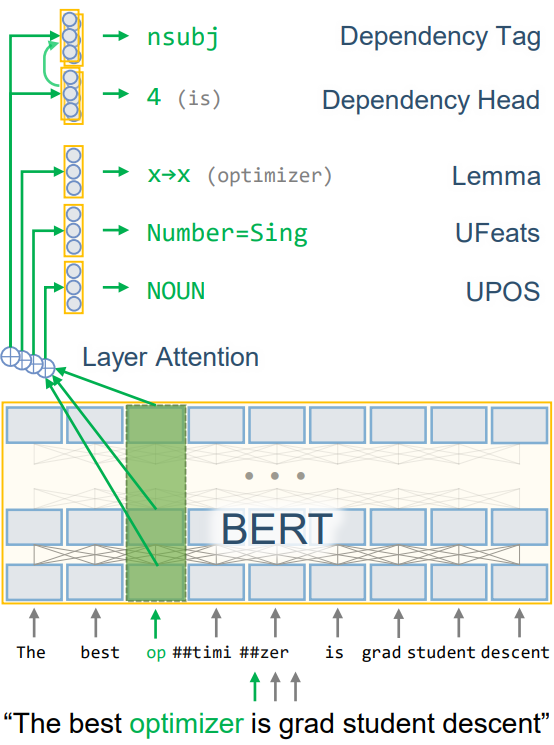UDify
UDify is a single model that parses Universal Dependencies (UPOS, UFeats, Lemmas, Deps) jointly, accepting any of 75 supported languages as input (trained on UD v2.3 with 124 treebanks). This repository accompanies the paper, "75 Languages, 1 Model: Parsing Universal Dependencies Universally," providing tools to train a multilingual model capable of parsing any Universal Dependencies treebank with high accuracy. This project also supports training and evaluating for the SIGMORPHON 2019 Shared Task #2, which achieved 1st place in morphology tagging (paper can be found here).
Integration with SpaCy is supported by Camphr.
The project is built using AllenNLP and PyTorch.
Getting Started
Install the Python packages in requirements.txt. UDify depends on AllenNLP and PyTorch. For Windows OS, use
WSL. Optionally, install TensorFlow to get access to
TensorBoard to get a rich visualization of model performance on each UD task.
pip install -r ./requirements.txtDownload the UD corpus by running the script
bash ./scripts/download_ud_data.shor alternatively download the data from universaldependencies.org and extract
into data/ud-treebanks-v2.3/, then run scripts/concat_ud_data.sh to generate the multilingual UD dataset.
Training the Model
Before training, make sure the dataset is downloaded and extracted into the data directory and the multilingual
dataset is generated with scripts/concat_ud_data.sh. To train the multilingual model (fine-tune UD on BERT),
run the command
python train.py --config config/ud/multilingual/udify_bert_finetune_multilingual.json --name multilingualwhich will begin loading the dataset and model before training the network. The model metrics, vocab, and weights will
be saved under logs/multilingual. Note that this process is highly memory intensive and requires 16+ GB of RAM and
12+ GB of GPU memory (requirements are half if fp16 is enabled in AllenNLP, but this requires custom changes to the library).
The training may take 20 or more days to complete all 80 epochs depending on the type of your GPU.
Training on Other Datasets
An example config is given for fine-tuning on just English EWT. Just run:
python train.py --config config/ud/en/udify_bert_finetune_en_ewt.json --name en_ewtTo run your own dataset, copy config/ud/multilingual/udify_bert_finetune_multilingual.json and modify the following
json parameters:
train_data_path,validation_data_path, andtest_data_pathto the paths of the dataset conllu files. These can be optionallynull.directory_pathtodata/vocab/<dataset_name>/vocabulary.warmup_stepsandstart_stepto be equal to the number of steps in the first epoch. A good initial value is in the range100-1000. Alternatively, run the training script first to see the number of steps to the right of the progress bar.- If using just one treebank, optionally add
xposto thetaskslist.
Viewing Model Performance
One can view how well the models are performing by running TensorBoard
tensorboard --logdir logsThis should show the currently trained model as well as any other previously trained models. The model will be stored
in a folder specified by the --name parameter as well as a date stamp, e.g., logs/multilingual/2019.07.03_11.08.51.
Pretrained Models
Pretrained models can be found here. This can be used for predicting conllu annotations or for fine-tuning. The link contains the following:
udify-model.tar.gz- The full UDify model archive that can be used for prediction withpredict.py. Note that this model has been trained for extra epochs, and may differ slightly from the model shown in the original research paper.udify-bert.tar.gz- The extracted BERT weights from the UDify model, in huggingface transformers (pytorch-pretrained-bert) format.
Predicting Universal Dependencies from a Trained Model
To predict UD annotations, one can supply the path to the trained model and an input conllu-formatted file:
python predict.py <archive> <input.conllu> <output.conllu> [--eval_file results.json]For instance, predicting the dev set of English EWT with the trained model saved under
logs/model.tar.gz and UD treebanks at data/ud-treebanks-v2.3 can be done with
python predict.py logs/model.tar.gz data/ud-treebanks-v2.3/UD_English-EWT/en_ewt-ud-dev.conllu logs/pred.conllu --eval_file logs/pred.jsonand will save the output predictions to logs/pred.conllu and evaluation to logs/pred.json.
Configuration Options
- One can specify the type of device to run on. For a single GPU, use the flag
--device 0, or--device -1for CPU. - To skip waiting for the dataset to be fully loaded into memory, use the flag
--lazy. Note that the dataset won't be shuffled. - Resume an existing training run with
--resume <archive_dir>. - Specify a config file with
--config <config_file>.
SIGMORPHON 2019 Shared Task
A modification to the basic UDify model is available for parsing morphology in the SIGMORPHON 2019 Shared Task #2. The following paper describes the model in more detail: "Cross-Lingual Lemmatization and Morphology Tagging with Two-Stage Multilingual BERT Fine-Tuning".
Training is similar to UD, just
run download_sigmorphon_data.sh and then use the configuration file under config/sigmorphon/multilingual, e.g.,
python train.py --config config/sigmorphon/multilingual/udify_bert_sigmorphon_multilingual.json --name sigmorphonFAQ
- When fine-tuning, my scores/metrics show poor performance.
It should take about 10 epochs to start seeing good scores coming from all the metrics, and 80 epochs to be competitive with UDPipe Future.
One caveat is that if you use a subset of treebanks for fine-tuning instead of all 124 UD v2.3 treebanks,
you must modify the configuration file. Make sure to tune the learning rate scheduler to the number of
training steps. Copy the udify_bert_finetune_multilingual.json
config and modify the "warmup_steps" and "start_step" values. A good initial choice would be to set both to be
equal to the number of training batches of one epoch (run the training script first to see the batches remaining, to
the right of the progress bar).
Have a question not listed here? Open a GitHub Issue.
Citing This Research
If you use UDify for your research, please cite this work as:
@inproceedings{kondratyuk-straka-2019-75,
title = {75 Languages, 1 Model: Parsing Universal Dependencies Universally}
author = {Kondratyuk, Dan and Straka, Milan},
booktitle = {Proceedings of the 2019 Conference on Empirical Methods in Natural Language Processing and the 9th International Joint Conference on Natural Language Processing (EMNLP-IJCNLP)},
year = {2019},
address = {Hong Kong, China},
publisher = {Association for Computational Linguistics},
url = {https://www.aclweb.org/anthology/D19-1279},
pages = {2779--2795}
}
